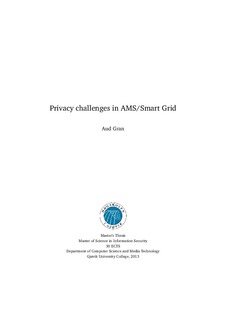| dc.description.abstract | The traditional power grid has served well in its existing period by transmitting and distributing
electricity from centralized generators to consumers. Characteristics of this grid has been a oneway
flow of energy and energy meters that have to be read manually. Environmental and societal
challenges rises new demands for a more effective and flexible solution for energy distribution.
Motivated by the combat against global warming and desire for national energy independence a
smart power grid is in development. Smart Grid (SG) is regarded as the new generation power
grid by utilizing modern information technologies to enable a two-way communication between
advanced smart meters and head-end systems at utility companies. While conventional power
grids are generally used to carry power form central generators to the users, SG uses two-way
flow of power and information to deliver electricity in a more flexible, reliable and cost-effective
way.
For SG fulfil its purposes, information communicated through Advanced Meter Infrastructure
(AMI) is much more fine-grained than the every two months readings in the traditional grid and
can because of that reveal information about habits and activities inside the resident based data
of electricity usage. This is a severe challenge in regard of the privacy of energy consumers, and
is a problem utility companies must address in the deployment of SG and Advanced Metering
Systems (AMS).
Collection of data classified as sensitive and personal is regulated by laws, but there are grey
zones between clearly illegal and legal data collection, storage and use. The purpose of data
collection must be clearly defined and communicated to the data subjects. The challenges in
regard of privacy in SG development are several, from creating a secure communication channel
for transporting data between the smart meters and the head-end systems and to establish a
trust amongst the energy consumers so they can feel safe that their personal information is not
compromised or misused.
This thesis takes a closer look at the concept of privacy in the context of AMS and SG and explores
the threats and vulnerabilities of privacy that exists in this infrastructure. Based on this the thesis
presents results from interviews with several Distribution System Operators (DSO) where they
have been asked how they address privacy challenges in their AMS projects and how they regard
privacy concerns in the future power grid. | no_NO |
